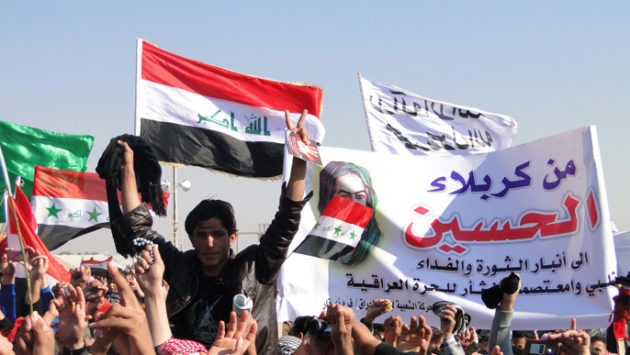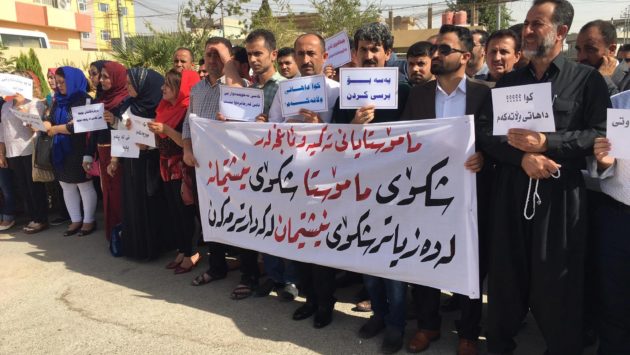Balancing Washington and Tehran will be the Biggest Test for the Upcoming Kazemi Government
Baghdad – Bara Al-Shammari
11 April 2020
The newly designated Iraqi Prime Minister, Mustafa Al-Kazemi, did not directly discuss the escalating Iranian-American conflict in Iraq in his first public address, instead he limited his comments to his government’s aim to maintain a balance with its friends and neighbors. But whether or not it was mentioned explicitly, Al-Kazemi’s government will find itself confronting a complex knot of tensions between Washington and Tehran if it obtains the needed confidence of parliament.
Both countries welcomed Al-Kazemi’s mandate to form the new government. The Iranian Foreign Ministry expressed its willingness to cooperate with the new Iraqi government to overcome the country’s problems.The US Assistant Secretary of State for Near Eastern Affairs, David Schenker, said in an interview with reporters in Washington, “If Al-Kazemi is an Iraqi committed to achieving sovereignty for Iraq and fighting corruption, it will be a great thing for Iraq, and we think it will be wonderful for our bilateral relationship. Baghdad needs to take steps if it is to strengthen its relationship with America.”
A prominent politician who participated in the political process which led to the choice of Al-Kazemi, told “The New Arab” that the issue of removing American forces was raised in the meetings that preceded the appointment, indicating that some of those present at the meetings were interested in ensuring that the new government had the necessary resolve to rid Iraq of American presence quickly and definitively.
Other parties, he reported, expressed the belief that the new government has the right to decide itself the foreign policy to be followed, but must take into account the parliament’s previous decision to remove American influence from the country. This would allow Al-Kazemi to place Iraq in a gray area, hanging between the Americans and the Iranians, able to sustain relations with both. The Abdul Mahdi government had clearly aligned itself with Iranian camp.
Member of the Iraqi Parliament, Muhammad Karim, told “The New Arab” that Al-Kazemi has the skills needed to solve the problem of the American presence in Iraq as well as those required to navigate the issues between Tehran and Washington which are being played out on Iraqi soil. He stressed that Al-Kazemi has balanced relations with both America and Iran, and pointed out further that he had previously been a successful negotiator between Iraq and other countries, and thus has the critical experiences needed to solve problems and overcome crises.
He pointed out that Al-Kazemi will work to avoid provoking America or Iran during the implementation of his foreign policy, explaining that “the current situation indicates that Iran does not want to impose its hegemony within Iraq, nor does America.” He also stated that the government is in a position to work to calm tensions in light of this lack of interest on the part of both Americans and Iranians. This suggests that Al-Kazemi’s government should pass in parliament without obstacles.
Former member of parliament, Izzat Shabandar, considers the Al-Kazemi government to be a product of regional and international consensus, saying in a tweet, “The coronavirus pandemic has forced the greatest world powers to lay down their weapons and their aggressive instincts in order to allow the earth to breathe and to allow peace and harmony to prevail, even in the most conflict ridden parts of the world, including Iraq. After months of confusion and frustration,” he continued “there is international and regional consensus about the political situation in Iraq.”
“Surrendering our sovereignty is a line we will not cross: no compromise can jeopardize Iraqi sovereignty,” Al-Kazemi said in his speech to the Iraqis on Thursday, 9 April. He went on to explain that “Iraq is an ancient country and its sovereignty is not a controversial issue. Iraq’s rule is firmly and permanently in the hands of its people.
A professor of international relations at Baghdad University, Alaa Al-Muaini, noted in an interview with “The New Arab” that Al-Kazemi did not mention America nor Iran directly in his speech, but instead focused on sovereignty. This means that the foreign relations will be at the top of his priorities. Alaa Al-Muaini expects that Al-Kazemi will avoid aligning his government with one side at the expense of the other.
Al-Muaini added that “if Al-Kazemi sides with Iran, this may push him to a similar fate of Adel Abdul Mahdi, who was forced to resign. If, on the other hand, he leans away from Iran this may lead him to the fate of Al-Zarfi.” Attention will be directed towards “the strategic dialogue” between Baghdad and Washington scheduled to begin in about two months. The forum will discuss strategic issues, including the future of the American presence in Iraq.



